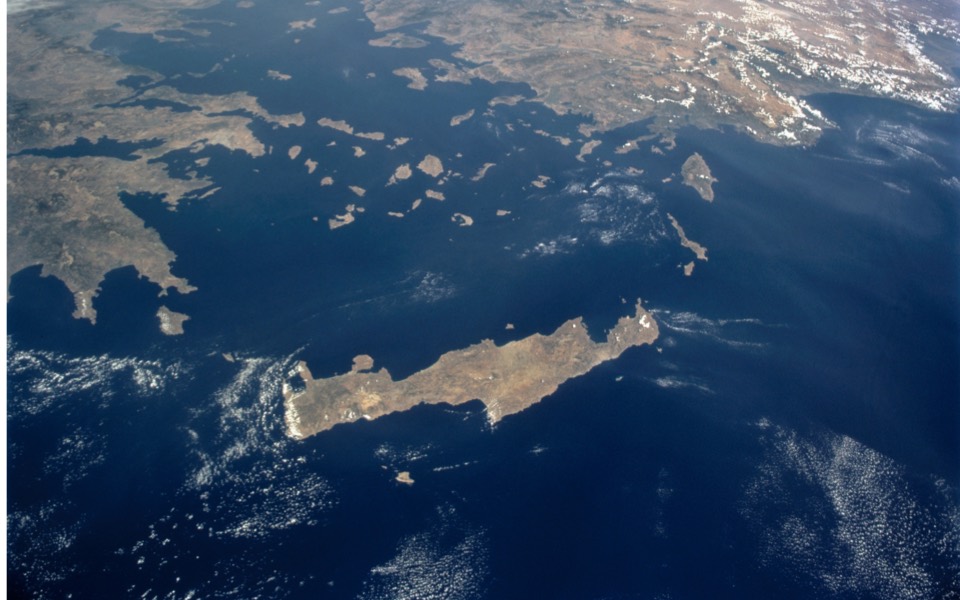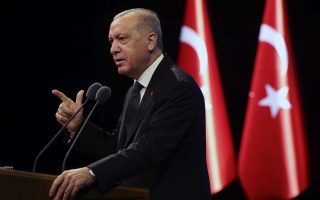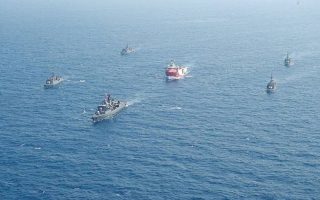The West’s eastern frontier: From Thermopylae and Salamis to the Aegean Sea

It is not necessary to reiterate that Thermopylae and Salamis saved Greece and the Western civilization. They countered despotism, thus saving democracy and the anthropocentric political and social systems. History is not just what happened, but also what happened because of it. Since then, Thermopylae has remained the ecumenical symbol of valor, heroism and sacrifice. “No surrender.” And Salamis is the paradigm for political and military leadership, strategy, as well as psychological warfare.
Two thousand five hundred years ago, Xerxes embarked on an unprecedented military expedition against Hellas. Herodotus offers an amazing account of the Persian multiethnic army. He also offers us an account of the Greeks’ state of mind. Xerxes, Persia’s king, asked Demaratus, the ex-king of Sparta self-exiled to Susa, to explain the state of the Hellenes. Demaratus commented: “…there is no way that they will accept your stated intention to enslave Hellas. Next, even if all the others come to see things in your way, the Spartans will certainly oppose you in battle. You need not ask as to their number in order to consider how they could possibly do this, for if there are 1,000 of them marching out, they will fight you, and if they number more or less than that they will fight you all the same” (Herodotus, Polymnia, 102-103). Any overwhelming difference in the size of the aggressor’s army never deterred the Greeks. Demaratus further elaborated that the Hellenes were fighting as free men, not from fear. They wanted to defend their homeland and their freedom.
With “The Persians,” Aeschylus offers us an epic and lyric account of the naval encounter of Salamis. Written in 472 BC, “The Persians” is the oldest surviving Greek tragedy. It is the first known play based not on myth but on historical fact, the defeat of the Persian Army in the straits of Salamis. My favorite extract from “The Persians” is the following: In the presence of the chorus of Persian Elders, the Persian Messenger gives Queen Atossa, Xerxes’ mother, his account of the battle, describing the way the Hellenes launched the naval attack: “…They rushed hard at us with a great shout: ‘Charge! Greek men, set your country free! Save your children, your wives, the holy temples of your fathers’ gods, the sacred tombs of your ancestors! Now is the time to fight for all these things!”
Let me now put a marker on a few facts related to the past, yet so relevant to the present:
1. Greece, Europe’s gatekeeper: Xerxes was fully aware that by defeating Hellas he was also going to conquer Europe. He confessed to his fellow Persians: “…There is no state, there is no human nation who could resist us on the battlefield, once we defeat the Hellenes” (Herodotus, Polymnia, 8-9). Today the situation is not much different. In March 2020, Turkey orchestrated a hybrid attack using mostly irregulars, mixed with illegal immigrants and some refugees against the common land border with Greece at the Evros River as well as illegal crossing attempts in the Aegean Sea.
The alarming daily aggressive air and naval operations by Turkish forces targeting Greece, Cyprus and occasionally France are a threat to international peace and security. Turkey’s despotic President Recep Tayyip Erdogan publicly stated several times in March that by marching against Greek borders he was aiming at Europe. His adventurism matches that of Xerxes. With his characteristic arrogance, he directly insults and challenges European and transatlantic values on a daily basis.
2. Back to Herodotus. Before launching the military campaign, Xerxes dispatched envoys to the Hellenic cities demanding the traditional symbol of surrender and submission – an “offering of earth and water.” The cities refusing the “offer” were bound to be destroyed. Two thousand five hundred years later, President Erdogan’s message is: Accept my terms on everything we forward as our own bilateral agenda or you will face the consequences of war. Since 1975, Turkey has been threatening Greece with a casus belli (declaration of war). This menace is a violation of Article 2, Paragraph 4 of the United Nations Charter, which states that “all members shall refrain from the threat or use of force against the territorial integrity… of any state.” It is also a blunt violation of NATO’s Charter, which states (Article 1): “The Parties undertake, as set forth in the Charter of the United Nations, to settle any international dispute… by peaceful means in such a manner that international peace and security and justice are not endangered, and to refrain in their international relations from the threat or use of force in any manner inconsistent with the UN purposes.” While Turkey is targeting two NATO allies, France and Greece, implementing Article 1 would be enough. This is not the case. NATO’s credibility is at its lowest. Apathy, double standards and a non-principled stance could lead to the hazardous implementation of NATO’s Article 5 (intra-allied solidarity) on an opt-in/opt-out basis.
3. Painting the picture of today’s Xerxes could also include:
A) Since July 1974, Turkey has illegally occupied the territory of the Republic of Cyprus. Formally, since 1996, it has been threatening Greece with war. In 1976, 1987, 1996 and now in 2020, Turkey’s unlawful policies have brought the two countries close to conflict. Megalomania and fanaticism with now clear religious connotations prevail in Ankara.
B) Russian weapons such as S-400 missiles are being purchased by Erdogan’s Turkey. Russia’s President Vladimir Putin would never provide such lethal weapons without formal guarantees that they should never be used against Russia. So, possible targets are NATO allies such as Greece, France, the United States and eventually Israel, Cyprus, Egypt, the Emirates etc.
C) Israel’s enemies are President Erdogan’s associates; apparently, the Hamas leadership now has a Turkish passport. Turkey has no ambassadors in Israel and Egypt and is almost at war with Armenia. Wherever they live (Turkey, Syria and many in Iraq), Kurds are also considered Turkey’s targets. President Erdogan likes to discover enemies: enemies at home, in the neighborhood, in Europe, in the US Congress and among key American political leaders. Enemies everywhere.
D) According to the US State Department’s annual Country Reports on Human Rights Practices released in March 2020: “…Significant human rights issues included: reports of arbitrary killings; suspicious deaths of persons in custody; forced disappearances; torture; arbitrary arrest and detention of tens of thousands of persons, including former opposition members of parliament, lawyers, journalists; …the existence of political prisoners, including elected officials and academics; significant problems with judicial independence; severe restrictions on freedom of expression, the press, and the internet, including violence and threats of violence against journalists, closure of media outlets, and unjustified arrests or criminal prosecution of journalists…” Yet, European Union members and officials seem well-accommodated.
4. Peace in accordance with international law and the UN Charter is the backbone of Greece’s policy. “Peace is not merely the absence of war; it is the presence of justice” (Martin Luther King Jr). Two thousand five hundred years after Thermopylae and Salamis, Hellenes have the will and the capabilities to defend their homeland. Any unilateral action by Turkey will probably result in an all-out confrontation adversely affecting US, NATO and European security interests.
Alexandros P. Mallias is the former ambassador of the Hellenic Republic to the United States (2005-09).





